What would you do if you could live a different life? One where you’re stronger, more confident, richer, and more famous? Ke Huy Quan‘s Waymond explores that in his role as Waymond Wang in Everything Everywhere All At Once. Directed by The Daniels, Daniel Kwan and Daniel Scheinert, Everything Everywhere is about a woman named Evelyn (Michelle Yeoh) who must explore the multiverse in order to save it, all the while trying to balance a tenuous relationship with her own family. Quan plays Waymond, Evelyn’s husband and the father of their daughter, Joy (Stephanie Hsu). Waymond is kind, funny, and mild-mannered. But when different versions of him begin to reveal themselves, we learn much more about where Waymond’s life could have gone had he made different decisions.
Ke Huy Quan is a Vietnam-born Chinese American actor and stunt choreographer. After acting in 80s hits like The Goonies and Indiana Jones and the Temple of Doom, Quan retired from acting in 2002 due to the lack of opportunities for Asian American actors. But, with the success of Crazy Rich Asians, Quan returned to acting, starring in the recent film Finding ‘Ohana and now in Everything Everywhere All At Once. He will also be appearing in the Disney+ TV adaptation of American Born Chinese, the graphic novel by Gene Luen Yang alongside co-star Michelle Yeoh.
We spoke with Ke Huy Quan about what drew him to this project, what inspired his return to acting, the nuances of Chinese American culture, and working with filmmaker Wong Kar-Wai, who he worked for as an assistant director on 2046. Read more below!
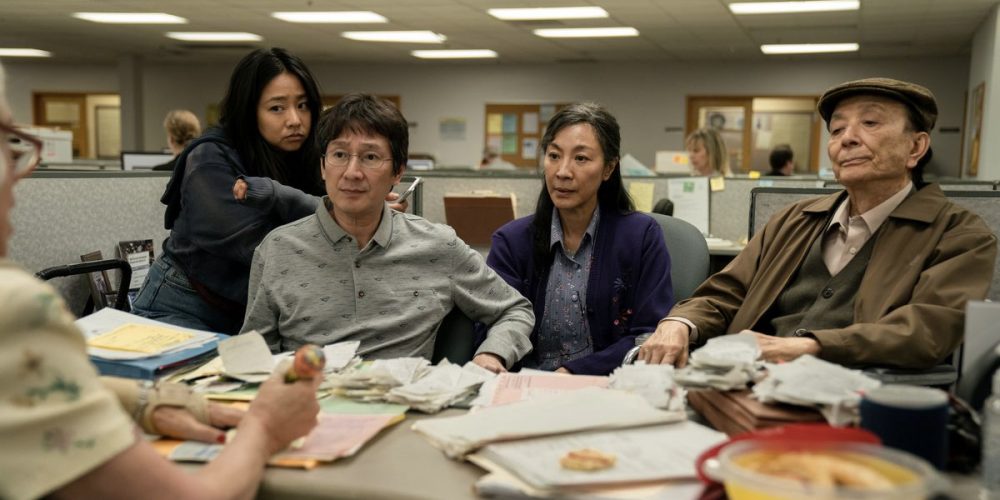
Therese Lacson: I just wanted to say that I absolutely loved you in this movie. I want to know what drew you to this film and to this role?
Ke Huy Quan: When I read it, I thought it was one of the most brilliant and beautiful scripts that I have ever read. And Waymond, this character, oh my gosh! Having not done this in 20 years, and to come upon this, it was just incredible. And honestly, one of the reasons why I stepped away from acting was because of the roles that were being presented in Hollywood at that time, in the early 90s, it really was so stereotypical and so marginalized. I’ve auditioned for roles where the character didn’t even have a name and it was just a couple of lines. To have this come along, it was just an amazing opportunity that I couldn’t say no to.
And again, I auditioned for the Daniels. I wanted this more than anything else, you know? Had you asked me do I want to win the lottery? Or do I want to win this role? Without a doubt, I wanted this. So, I’m so grateful to them for giving me this opportunity to be in this movie with all these crazy talents. And of course, allow me to play Waymond, who is an amazing character.
Therese: I would love to know your first reaction to the script when you read it because this movie is absolutely wild. I loved it, but it was crazy. What were your initial thoughts when you finish reading the script?
Ke Huy: Well, before I read it, I was told please watch Swiss Army Man to really understand the sensibilities and the comedy. And when I saw that movie, it made me laugh, it made me cry. I fell in love with the characters. I was totally immersed in the story and movie. And I felt that if they can do that, with such an outrageous story about a corpse that farts throughout the entire movie, I think they can do anything. So when I began, I remember turning to page one and starting to read it, it was just incredible. I laughed so hard, I don’t think I’ve ever laughed so hard reading a script. All the action stuff and all the craziness, the outrageousness, of how far into the multiverse they take this, I thought it was just so inventive, original, and creative. All of that. I got it from the first moment I read it. I just didn’t know how far they would take it.
So while we were on set, I was really curious to see what they would do with it. It was incredible to witness. Because we shot the majority of the movie with practical sets. There were only one or two days where there was a green screen, but a lot of it was practical. I started out in the 80s, where it was like this, to step on that set and to see how they were doing it, there was really a sense of familiarity. This is what I was accustomed to — the shooting and everything practical. But again, back to the script, I thought it was a wonderful script, and for them to choose to tell the story featuring a Chinese American family. That was amazing. And I am multiverse grateful to them.
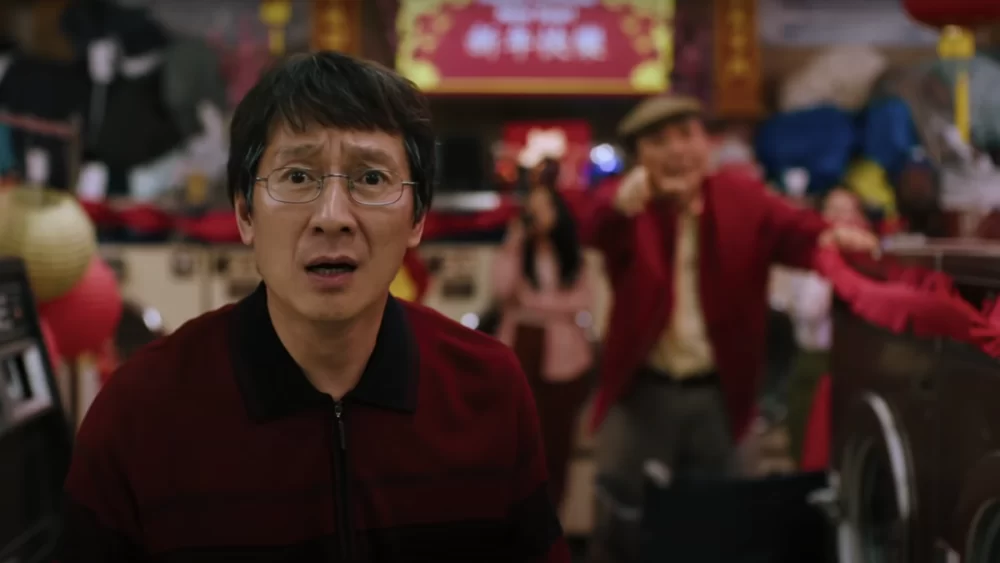
Therese: I just want to touch on something that you mentioned before, you know, as an actor who has been in this industry for a few decades and you actually took a break from the industry. What is your opinion about the changes in the industry lately when it comes to including more of these types of stories?
Ke Huy: I think changes are definitely happening, it may not move as fast as we want, but all sustainable improvements happen gradually. My return to acting is a direct result of that progress. And I am so grateful for the Asian representation we’re seeing today. And I mean, we didn’t have this, when I started out in the 80s. It was extremely difficult for an actor at that time. For many years, I was content just working behind the camera. To see how it grew from one to two Asian actors being featured in prominent roles to where we have an entire cast made up of Asian actors, like, Fresh Off the Boat and Crazy Rich Asians, and Shang-Chi — now we get to be the superhero, we get to be the romantic lead. And now, like this, we get to tell a story about, not just identity issues, but issues that are relatable to everybody — generation gaps and about a mother who’s trying to keep her family together. All these are very humanistic themes. So I’m very optimistic about where we are now and where things are headed. I’m hopeful, I’m very inspired. I think there’s a lot more work to be done, but I’m happy.
Therese: I’m really curious, as somebody who’s worked in Hollywood and has also worked in the Asian Film Industry, I want to know if there are any major differences that you’ve noticed working in these two industries.
Ke Huy: There’s a lot. One is budget issues, you know, Asian movies don’t have a big budget like Hollywood movies do, also with the time. But believe it or not, working on this movie, we had a very tight budget and a tight schedule. We shot this movie in 38 days over an 8-week period. You can only imagine, I mean that was a thick script. And every single thing, there was a lot of stuff to shoot, we didn’t have the luxury of doing 10-20 takes. And this is really a credit to our producers, the Daniels, and our entire crew. We didn’t have time for hiccups or errors. Everything went smoothly. There are a lot of similarities. But at the same time, there are a lot of differences. One system is not better than the other. That system works for Hong Kong, or elsewhere in Asia, and here it works in Hollywood. It’s two very different systems. But I think, yes, you’re right. I’m very lucky to have the perspective of both, and I appreciate both.
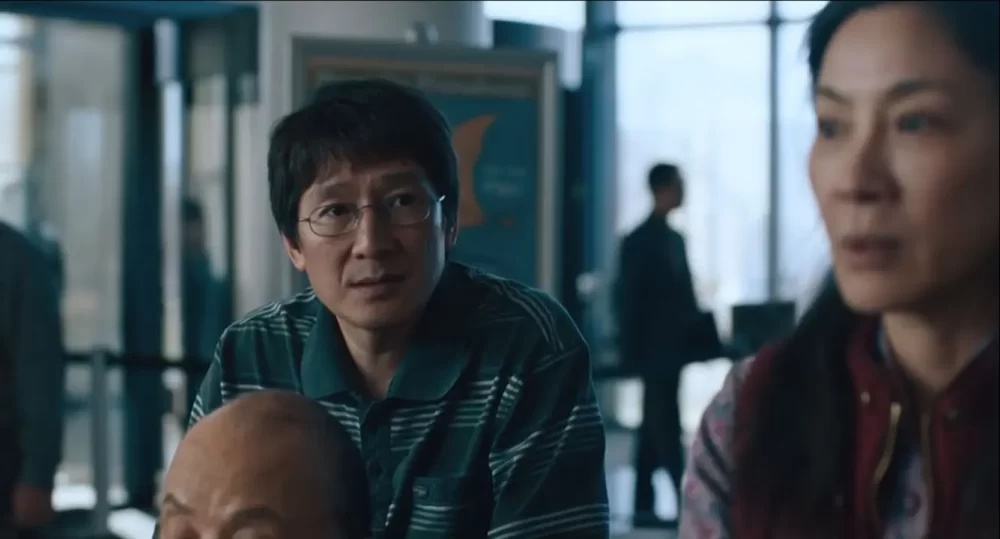
Therese: Yeah, I’m just always curious about that, especially seeing actors go back and forth and getting their different perspectives on that.
Ke Huy: I worked with Wong Kar-Wai for many years, where we didn’t have a script. So, this is the big contrast! Here is a man who is an amazing filmmaker, one of the best in the world, where we work on a movie for five years and we never had a script. It was always, he would write in his office, he would write a page or two, and that’s what we would shoot. Versus on Everything Everywhere All At Once, we have the entire script ready, and we didn’t make one change to the script during the entire production of our movie. So, to be able to go from that to this, I mean, I think that’s what’s so great about — I always say a full life is a life full of many different angles, ups and downs, peaks and valleys. I’m very fortunate to say that I can experience all of these different things at once.
Therese: Yeah, just touching on that. I mean, first of all, I love Wong Kar-Wai’s films, so I’m glad that you mentioned him. In this film, there are a lot of different versions of your character, obviously. What was it like approaching all of these different versions of your character and finding a balance? Because it is interesting to see different aspects of an Asian man being portrayed in Hollywood and see those different aspects coming to life in your character.
Ke Huy: Yes, but first of all, I want to say, because just having worked for Wong Kar-Wai, I loved the homage we did for him in the CEO Universe.
Therese: Yes!!
Ke Huy: Because for years, I was behind the camera watching Tony Leung in front of the camera doing that, and the Daniels are big fans of him. I’m a big fan of him. So, for me, to switch angles, to switch perspective, and do it in front of the camera, that was really that was quite exciting. And for me, the challenge was even though it’s a different version of the same character, I wanted them to be three different characters. And I wanted the audience to be able to see and distinguish, clearly, whether you’re watching Waymond, Alpha Waymond, or CEO Waymond. And honestly, I don’t think I would have been able to play this character had it been given to me 10-15 years ago. I need all that life experience to play all of them, and I’m a part of all these different characters, and I understood them. From the very beginning, because of how beautiful and how rare this character is in Hollywood, I really wanted to give it justice and I wanted to make sure I did it right and didn’t disappoint. So I did a lot of research, I did a lot of homework.
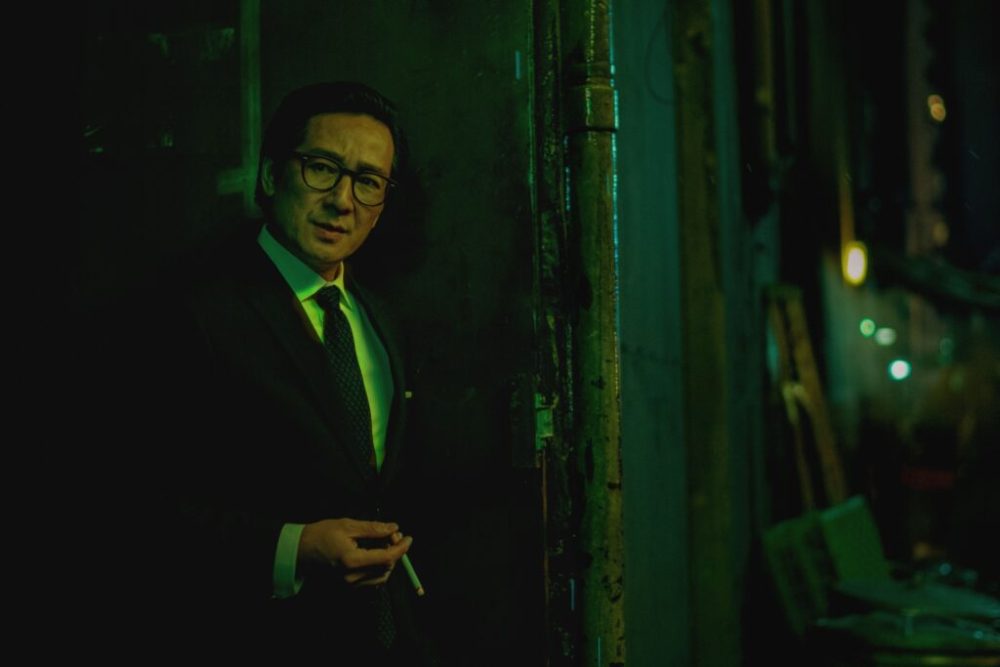
In fact, we had three months of prep time. So I hired an acting coach, a dialogue coach, a voice coach — so they sound different — and then a body movement coach, to me teach me how to move differently for them. For example, Alpha Waymond, because he’s a fighter and he’s very decisive, he always stands up straight. Waymond, he’s not a very confident kind of a guy, he’s meek and mild-manner, and he loves his family. So he always has a little slouch in his body. And CEO Waymond, because he lost the love of his life and he was forced to go down a path that he was not willing — and I know that feeling. That was me in my early 20s when there were no acting opportunities for me, and I have to give that up. So I understood CEO Waymond, even though he’s very successful now, he has all the money in the world, but I think he wishes he would have had the love of his life and a daughter like Joy. I spent a lot of time mentally and really digging deep within my life to pull all these different emotions and experiences that happened along the way and pull all of it into each version of Waymond.
Therese: Yeah, I definitely felt the effect of that. And, I just want to touch a little bit on the use of Chinese in this film. Because I’m Chinese myself, and I grew up in a household where we’re using Mandarin and Cantonese and Shanghainese, like, my dad would switch back and forth, and I haven’t always seen that in films. I feel like you see that a lot more in Hong Kong cinema, but you don’t see it a lot in Hollywood. I’m just curious, what are your thoughts on seeing this more fluid change between dialects and even like switching back and forth between Mandarin and English.
Ke Huy: Yeah, it’s never been done before. But you and I know… [In Mandarin] do you speak Mandarin or Cantonese?
Therese: [In Mandarin] I speak Mandarin, I can understand Cantonese, but I don’t speak it very well.
Ke Huy: [In Mandarin] You speak it very well. [in English] So, you and I know, it’s a very natural thing to do for the Chinese diaspora living in America today, because that was what our household looked like. To this day, with my wife, who also speaks English, Mandarin, and Cantonese, our conversation consists of almost all three languages. That’s what it was like growing up, and Daniel Kwan is Chinese, so I’m so happy that he incorporated this element of our culture into it because it’s a very natural thing to do. And like you said, it’s so rare, but it really gives an idea of what a Chinese family is like, and it’s done with a lot of heart, with authenticity, and integrity.
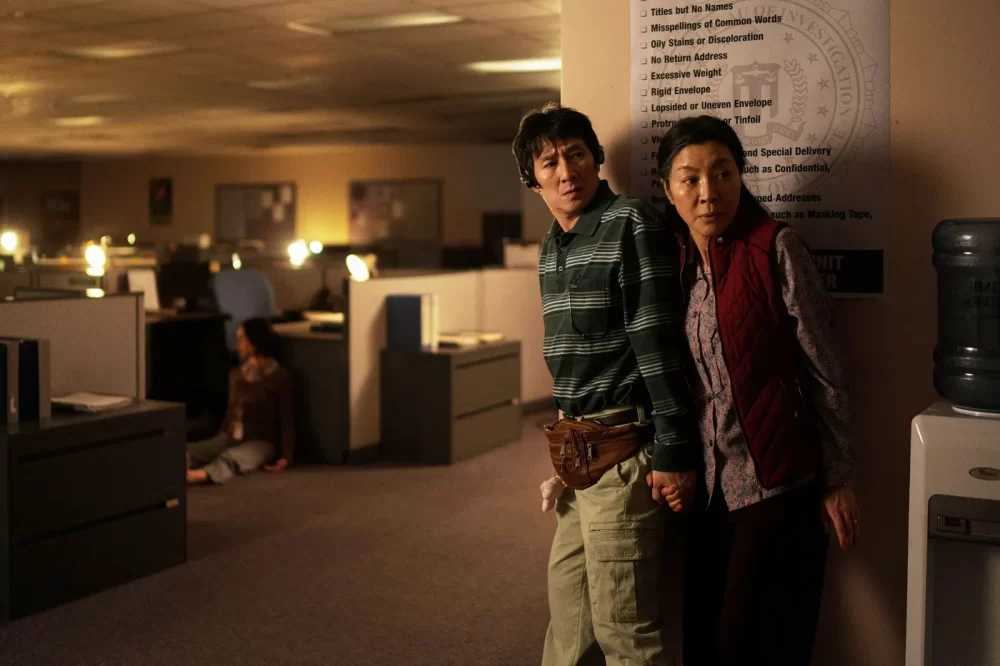
I remember walking on the set of the Wang family’s home, and I walked into the kitchen and I remember opening up the cupboard, and a lot of the sauces in the cupboard were the same sauces that I had at home. You know? Hoisin Sauce, Sriracha, Maggi Soy Sauce, all of that. It was really done with a lot of care, a lot of love, a lot of respect, and I think it has a lot to do with Dan Kwan, as well. And Daniel Scheinert, he understood all of that, because that’s his best friend. That’s his co-director. They paid so much attention to detail and nuance in this. And I think from the get-go, they made sure they had this conversation with our production designer, our set designer, our costume designer. Even how we dressed in the movie, that’s how we dressed back when my family first came here. I remember laughing when I was trying on the Waymond outfit in the laundromat, and I said to our our costume designer, Shirley Kurata, “Oh my God, that’s what my dad wore.”
So it was great, and I’m really happy. I’m very proud of our movie. I think that, hopefully, the audience will see it and get to see a different portrayal of a Chinese American family. Every time you see an Asian actor up on the screen, it doesn’t have to be an identity issue. We don’t have to give him a reason. What’s so beautiful about this movie is that, not only is it a big sci-fi action comedy movie, but at the core of it, it’s really about this family with issues. Family issues that are relatable to everybody, regardless of your race, your social status, your religion. None of that matters if you strip all of that away. It’s just a beautiful movie about love, about family, about connection.
Everything Everywhere All At Once is in limited theaters now, and will have a wide release April 8th!


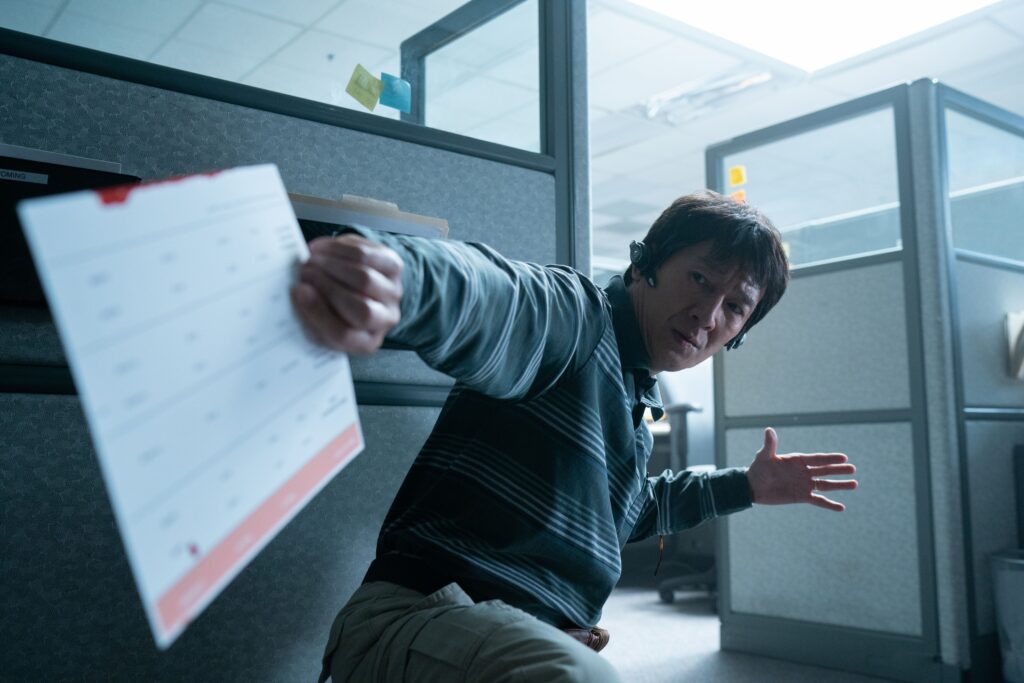
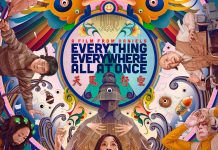
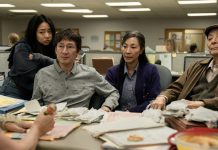
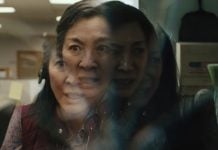


Really loved this interview especially the question about Mandarin/Cantonese in the film. Thank You!
Comments are closed.